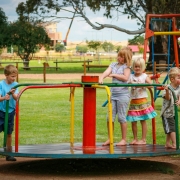Tips for Mastering Foreign Language
Mastering a foreign language is a tough task for even an adult, imagine a child who barely has a grasp of the English language (or any native tongue for our European brothers and sisters). Actually, teaching a child a foreign language is much more successful then an adult! They have an enthusiasm for new challenges that an adult can only wish for! The biggest challenge for anyone learning a new language, young or old, is keeping up the practice so that it becomes a second language. Here are some tips and tricks we use with our children (and ourselves) who are learning a foreign language.
First, you should choose a language that is special to the child’s heritage. Whether it is Gaelic, German, French, Italian or whatever, start them out on a heritage based language. Children like to have lessons they can identify with and the deepest most profound is by far their heritage, it is who they are! I currently help my children with German, and they love it. Their Grandmother and Grandfather both speak it a little, and both sides of my and my husbands family are German. Our children have a great time speaking German with their Grandparents, as well as, hearing stories of the “German Part of Town” in Wisconsin and how people in that state retained their sense of identity with their Heritage through speaking their native tongue and preserving their Folk ways. Great lessons in more then just foreign language!
Then get your children enrolled in a class or some kind of foreign language course. Unless you are fluent in the new language that is taught to the child, you need to have them in a class. Try a community college or parks and recreation, they usually have introductory courses for a reasonable price. Also, talk to the local public school. If you have to be enrolled in the school as part of the home schooling law, then you should also be able to participate in extracurricular activities. It is worth a try!
Next, get some books like a German/English dictionary or whatever language you choose. Then get some First Language books or just some other support type materials. Each foreign language book differs so having a few helps give a rounded base for the language.
Get some taped instruction so you can get the correct pronunciation of the words and characters. You can’t have the German teacher there all the time so a Language on tape series is helpful. Each language has its own accents and pronunciation, having some kind of recorded media that teaches the correct way to say words and letters will help ensure success.
Also, take 3 X 5 note cards and put common phrases, questions, answers to the questions and objects on them, then post them around the house. Make a game of speaking the language everyday. We have “I am thirsty” and ” I am hungry” as well as “What would you like?” along with the word for “refrigerator” on the door of the refrigerator. By the front door we have “Door” and “open” and “closed”, it is fun to speak to each other in the new language, and it involves the whole family including the 2yr old!
Finally, when ever there is someone who speaks your new language, try getting your child talking to them a little. People from foreign countries love when children speak to them in their native tongue. Be polite, ask them first before the child tries to start talking to them.
Learning a foreign language can be a long process, the best thing to do is make it part of your child’s daily life. Sing songs, watch foreign language films, and speak a mixture of English (or your native language) along with the new one even if there are only a few words, this will make it fun! You could even make it a Foreign language immersion program for a week by making dishes native to the foreign country, getting your encyclopedia and study the countries that speak it! One last idea is to get TV shows and coloring books or preschool-elementary school reading books to translate. Whatever language you choose, children and parents benefit greatly through increased critical thinking skills as well as higher level thinking skills. Also, it may even help improve your native language skills! Good Luck, turn these ideas into foreign language action!


Leave a Reply
Want to join the discussion?Feel free to contribute!